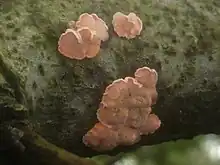Phaeotremella mycophaga
Phaeotremella mycophaga is a species of fungus in the family Phaeotremellaceae. It produces small, pustular, gelatinous basidiocarps (fruit bodies) on the hymenium of the corticioid fungi Aleurodiscus amorphus and A. grantii on conifers.
| Phaeotremella mycophaga | |
|---|---|
 | |
| Phaeotremella mycophaga on basidiocarps of Aleurodiscus amorphus | |
| Scientific classification | |
| Domain: | Eukaryota |
| Kingdom: | Fungi |
| Division: | Basidiomycota |
| Class: | Tremellomycetes |
| Order: | Tremellales |
| Family: | Phaeotremellaceae |
| Genus: | Phaeotremella |
| Species: | P. mycophaga |
| Binomial name | |
| Phaeotremella mycophaga (G.W. Martin) Millanes & Wedin (2015) | |
| Synonyms | |
|
Tremella mycophaga G.W. Martin (1940) | |
Description
Fruit bodies are gelatinous, hyaline to pinkish, up to 1.5 mm (0.05 in) across, and disc-like to pustular, sometimes coalescing Microscopically, the hyphae are clamped and occur in a dense gelatinous matrix. The basidia are tremelloid (globose, with vertical septa), 13 to 15 μm across. The basidiospores are globose, smooth, 6.5 to 8.0 μm across.[1]
Similar species
Phaeotremella simplex occurs on the same hosts and is indistinguishable in the field, but lacks clamp connections. Phaeotremella mycetophiloides is also similar, but was originally described from Japan. It may represent an earlier name for P. mycophaga.[2]
Habitat and distribution
Phaeotremella mycophaga parasitizes the corticioid fungi Aleurodiscus amorphus and A. grantii, both of which occur on dead attached wood of conifers. The species was originally described from Canada,[1] but has been found elsewhere in North America[2] and in continental Europe.[2][3]
References
- Martin GW (1940). "Some heterobasidiomycetes from eastern Canada". Mycologia. 32: 683–695. doi:10.2307/3754653.
- Bandoni R, Ginns J (1993). "On some species of Tremella associated with Corticiaceae". Transactions of the Mycological Society of Japan. 34: 21–36.
- Pilat A (1953). "Über das Vorkommen und die Verbreitung von Tremella mycophaga Mart. in Europa" (PDF). Sydowia. 7: 316–320.